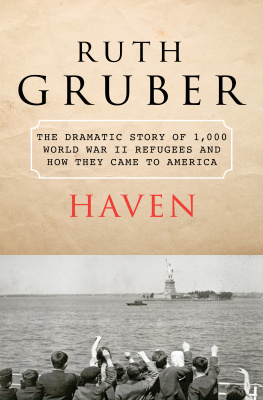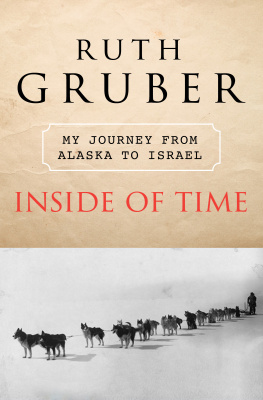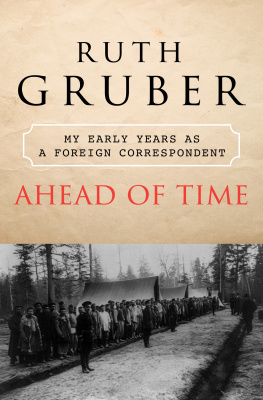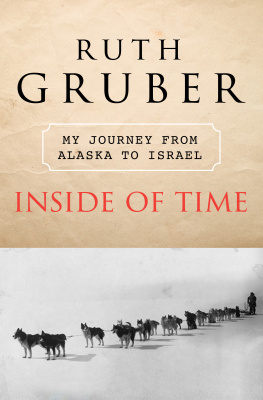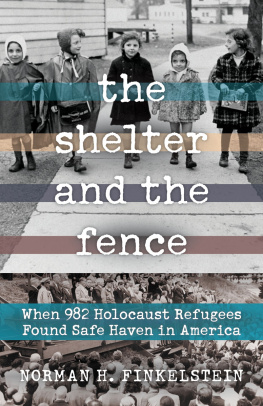Haven
The Dramatic Story of 1,000 World War II Refugees and How They Came to America
Ruth Gruber

To my four young grandchildren
Michael Philip Evans,
Lucy Jennifer Evans,
Joel Philip Michaels, and Lila Sarah Michaels
CONTENTS
PART ONE
THE STRUGGLE IN WASHINGTON
PART TWO
THE VOYAGE OF THE HENRY GIBBINS
PART THREE
THE OSWEGO ADVENTURE
PART FOUR
AFTER THEY CROSSED THE RAINBOW BRIDGE
T HIS IS A TRUE STORY.
Few people are aware, and those who knew have largely forgotten, that nearly one thousand refugees were brought to the United States as guests of President Franklin Delano Roosevelt during World War II.
Transported on an Army Transport Ship with wounded soldiers from Anzio and Cassino, hunted at sea by Nazi planes and U-boats, brought to haven in Oswego, New York, they were to know the exquisite relief of freedom from bombings and terror. Refugees from eighteen countries Hitler had overrun, they tried to rebuild their lives inside an internment camp on American soil.
As special assistant to Harold L. Ickes, secretary of the interior, I was sent by our government to escort them from war-torn Italy and help resettle them in Fort Ontario, a former army camp on Lake Ontario. Thus I became witness and participant. I experienced their joys and pain, rejoicing in their marriages and love affairs, sharing pride in their children, mourning those who died by their own hand or by acts of God.
Stowed away in the bottoms of filing cabinets were more than forty notebooks I had filled during the eighteen months my life was interwoven with theirs. These notebooks, together with copies of the reports, letters, and documents I had prepared for the government, were the major source for the events recorded in this book. Invaluable, too, were the diaries that Cabinet members frequently keep, made public by their heirs. When the Ickes family opened Secretary Ickess secret diaries to the world, I spent fascinated hours in the Library of Congress discovering the personal, often intimate details of his years in office, his battles, both epic and small, and his discussion of the assignments he gave me.
In Hyde Park, I dug into the voluminous diaries of Secretary of the Treasury Henry Morgenthau, Jr., and the papers of Eleanor and Franklin Roosevelt, all of whom played character roles, sometimes larger than life-size, on the Oswego stage.
Luck was with me. In the National Archives I uncovered the confidential log of the Henry Gibbins, the Army Transport on which I sailed with the refugees, and succeeded in persuading the government to declassify it.
Across the years, as I balanced my life as writer, wife, and mother, I continued my friendship with many of the refugees, who gave generously of their time and their memories. To all of them I give my heartfelt gratitude.
I have tried to write the story of the only group of refugees brought to America by the government during World War II with some of the humor I learned from them, with anger and passion and honesty, and with love.
THE STRUGGLE
IN WASHINGTON
ONE
T HE WORDS LEAPED at me from The Washington Post.
I have decided, President Franklin Delano Roosevelt announced, that approximately 1,000 refugees should be immediately brought from Italy to this country.
One thousand refugees.
Europe was burning. It was June 1944, the middle of the war.
For years, refugees knocking on the doors of American consulates abroad had been told, You cannot enter America. The quotas are filled. And while the quotas remained untouchable, like tablets of stone, millions died.
Suddenly, one thousand refugees were to be brought in outside the quotas, by order of the President himself. Until now I had felt helpless, frustrated, enraged. Noble speeches were made each day about saving refugees before they were swept into the fire, but the deeds belied the words. Our doors had been slammed shut. Now suddenly there was hope.
At my breakfast table, air-conditioned against Washingtons summer heat, I continued to devour the article. The thousand refugees, I read, would be selected by the War Refugee Board, transported to America by the Army, and housed in a temporary haven, a former army camp called Fort Ontario, in Oswego, New York. The camp would be administered by the War Relocation Authority of the Department of the Interior. Only a few months before, the President had placed WRA, soon to be disbanded, under Harold L. Ickes, the secretary of the interior. I was Ickess special assistant, his field representative for Alaska.
Ickes would know what lay behind this sudden humanitarian gesture.
At E Street I jumped out of a cab and looked up at the handsome gray stone Interior building with its great bronze doors and modern columns. Interiorthe vast grab-bag department of Indians, wildlife, Alaska, Puerto Rico, Hawaii, the Philippineswould now be in charge of Europes refugees too.
In my office, I telephoned Ickess appointments secretary and arranged a meeting for 11:55 A.M.
Ickes sat behind a huge desk littered with papers. His head was lowered as I began the long walk across the huge blue-carpeted office. He was writing with the thick scratchy pen I had seen him use countless times.
Sit down, he said briefly, and continued to write.
I sat in the armchair at the side of his desk. Behind him was a long table carefully stacked with books, newspapers, magazines. The Nation and The New Republic, to which he frequently contributed, were on top.
He finished his writing and buzzed for his secretary, who took the papers and disappeared.
Now he turned his full attention to me. Yes? he asked quizzically. I understand its urgent.
Its about the thousand refugees that President Roosevelt is inviting to America.
He nodded. The President sent me a copy of his cablegram to Robert Murphy in Algiers announcing it.
Mr. Secretary, I said, its what weve been fighting for all these years. To open doors. Save lives. Circumvent the holy quotas. Whats behind it? How did it happen?
He leaned back in his chair. His eyes looked weary. It came up in a Cabinet meeting with the President. It seems that Yugoslavian refugees and others are finding their way into Italy at the rate of about eighteen hundred a week. Its a problem for the military in Italy.
Was it Army pressure, then? The Allied armies were just now pushing up the boot of Italy. The papers were filled with the bloody battles of Anzio and Cassino. We had lost thousands of troops in the hills of southern Italy. I could see refugees fleeing into Italy on the heels of the Army. Clogging roads. Needing to be housed and fed.
Someone at the meeting, Ickes went on, I dont remember who, proposed that refugees be brought to this country. The President was still in favor of finding havens for them in Europe, Sicily, or parts of North Africa like Libya. I suggested, if any were brought to this country, that instead of coming to the mainland they be sent to the Virgin Islands. Theres plenty of room on the island of St. Croix, where the weather is mild, like southern Italy. Instead, theyre putting these people in New York State, near the snow belt around Lake Ontario.
But surely its not only because of the Army that were taking them in? It has to be more. It has to be humanitarian.
Of course its humanitarian. His eyes blazed through his gold-rimmed glasses. And its about time, too. Weve been trying for years to open the door to refugees. Look what happened to the Alaskan Development Bill we prepared here in the department.
Next page
